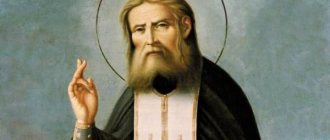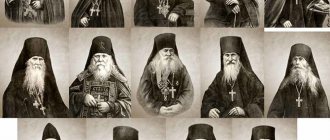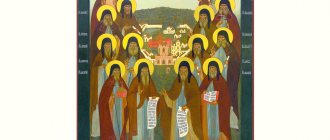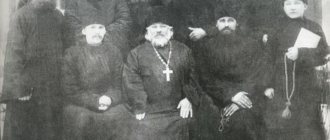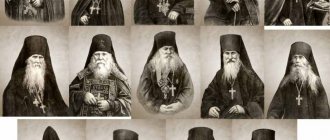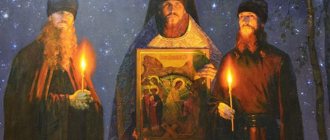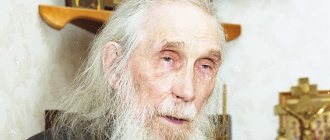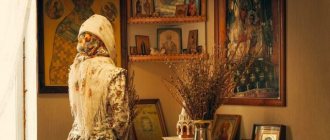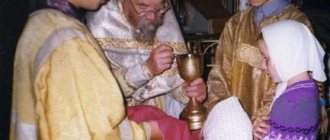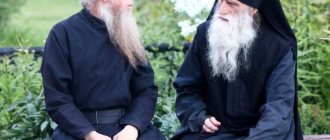Heir to the Optina Elders: In Memory of Archimandrite Venedict (Penkov)
Today, January 22, 2022, in the 79th year of his earthly life, Archimandrite Venedikt (Penkov) reposed in the Lord.
In Orthodoxy, the loss of loved ones is perceived somewhat differently than among non-church people. No, this does not cancel sadness and sorrow, but it protects us from the terrible sin of despondency. So, for a believer, death is by no means a fatal and irreparable loss, and therefore all the sorrow of loss for us must be combined with the realization that in the reality created by the Lord, there is no death. On the contrary, this is only the beginning of a new stage of existence, the union of our immortal soul with God in Eternal life.
Today, January 22, 2022, in the 79th year of his earthly life, Archimandrite Venedikt (Penkov) reposed in the Lord. Good shepherd, preacher and confessor. And, of course, known to millions of Orthodox people, the abbot of the legendary Holy Vvedenskaya Kozel Optina Hermitage - one of the main monasteries not only of the blessed Kaluga land, on whose territory it is located, but also of the entire Russian Land. A man who was born in the difficult pre-war years and experienced the Great Patriotic War as a child, and during the years of Khrushchev’s persecution of the Church, who made the courageous decision to devote himself to church service.
A monk of the Holy Trinity Lavra of St. Sergius, who had a wonderful experience of monastic life in, to put it mildly, conditions that were not the most favorable for the Russian Church, Father Benedict became the second abbot of the Optina Hermitage returned to the faithful at the turn of 1987-1988. Since 1990, Father has been reviving this greatest Russian shrine, putting a lot of effort and truly his whole soul into it. It was under him that the monastery of the holy Optina elders shone again, becoming not only historical, but a true heir to the spiritual traditions established in the 19th century.
Those who are familiar with the history of the Optina Hermitage know very well that many creative people were warmed by the gospel warmth that the Optina elders emitted. Nikolai Gogol and Fyodor Dostoevsky visited Optina, the famous Slavophile philosophers, the Kireyevsky brothers, were buried within the holy walls of this monastery, and here in 1891, Konstantin Leontyev, the brightest Russian conservative thinker of the 19th century, took secret monastic vows, leaving many warm and warm words about Optina Hermitage. deep words:
“The Russian spirit is here! It smells like Russia here,” and in many respects, even a very old Russia, which is still successfully defending itself from the new, liberal and cosmopolitan Russia...”
And it was precisely this “Oasis of Holy Rus'” that Optina Pustyn again became during the years of the viceroy of Archimandrite Benedict. It was he who did a lot so that representatives of the Russian intellectual community would again come to the monastery as often as possible. And this is one of the most important educational Optina traditions. Thus, in the 19th century, many representatives of the revolutionary-minded liberal intelligentsia that was emerging in those years literally “took the path of correction,” largely thanks to the instructions of the Optina elders. In the 21st century, one of the ways to revive Orthodox identity was the creation in the spring of 2006 of the permanent Optina Forum.
“It is a great lie to say that a person who does not bear sorrows on Earth will go to the Kingdom of God after death,” Archimandrite Benedict emphasized more than once, including in a conversation with the author of these lines, recalling the Gospel words of the Savior Himself that “ The Kingdom of Heaven is required,” that is, it is obtained with difficulty, with effort, sweat, and sometimes blood. And it was precisely these words that were always one of the main motivations for all the actions of the newly departed priest.
Of course, it is impossible to describe even part of what Father Benedict did in the format of a short article. But it is enough to come to Optina even for a short time to see the scale of what was accomplished during the years of his viceroy (from the monastery churches revived from oblivion to the monastic economy, which is striking in its scale). And most importantly, everyone who has visited Optina at least once returns from there as a spiritually transformed person. Among such people is the governor of the Kaluga region, Anatoly Artamonov, who, in an exclusive comment to Tsargrad, said the following heartfelt words about Father Venedikt:
“He was one of the great prayer books of the Orthodox Church. Not only a person enlightened in the field of Orthodox culture, as well as an excellent interlocutor and mentor, but also a true creator. If you remember what Optina Pustyn was like before Archimandrite Benedict became the governor of this monastery, and look at it now, the result of his righteous labors is admirable. The labors of all the brethren that he managed to gather around him.”
Also, the head of the Kaluga region especially noted that, despite his age, the priest always showed both the monastery brethren and thousands of guests of the Optina Hermitage the image and example of an eternal prayer book and worker:
“It is important that he did not shy away from any work. Everyone who visited the monastery was always shown the courtyard. Always, if it was time for summer work, he invited me to the fields. 800 hectares of land have always been in exemplary order, received the highest yields, high milk yields, produced and continue to produce honey and fish.”
Anatoly Artamonov, who knew Father Venedikt very well, personally mourns this loss, which he shared with the readers of Tsargrad:
“This is a man who will be missed by many, many thousands of people, pilgrims, believers who go to the holy monastery to venerate the relics of the Optina elders. I would like to express my sincere condolences to all the inhabitants of the monastery of Optina Monastery, the relatives and friends of Father Benedict, and everyone who knew him. We will all mourn this loss together. I would like to hope that his followers will carry with honor the word of God that he tried to convey to us...”
Nothing to add. In addition to the very important words of the funeral prayer for every Christian. The prayer that now, on the days of farewell to Father Benedict, is heard in many churches of the Russian Orthodox Church:
“In the blessed Dormition, grant eternal peace, O Lord, to Thy departed servant, the newly departed Archimandrite Benedict, and create for him eternal memory!”
Who is Archimandrite Venedikt Tsirkovy, who sang “Murka” in the church, and what else is known about him
Priest Venedikt Tsirovoy, who became famous for performing “Murka” during Lent in the refectory of a Moscow church, was exiled to Transnistria. Medialeaks tells where the video took place, what is known about Circov himself and his immediate supervisor, Archbishop Savva, and why priests from Tiraspol work in Moscow.
What is the name of the priest, where and when did he sing “Murka”
The first video of a priest performing the song “Murka” during a festive dinner to the accompaniment of an ensemble of folk instruments was posted on Twitter on April 2 by journalist Alexander Nevzorov.
Alexander Nevzorov
The priest went to work, he wanted a drink. Pop went into a chic restaurant.
The priest performs the song from start to finish, including the line “How many have I slaughtered, how many have I slaughtered.” It can be seen that some people in the room sing along, others turn away and do not look happy. The video was later posted on YouTube.
In Nevzorov’s replays, many began to make fun of the priest and the Russian Orthodox Church.
Maxat NurMuhammad
Orthodox thieves! Now I have seen everything.
Val Michel
Gundyaev was sitting there, in a miter and with cauldrons, and under his cassock was a sword and a revolver.
madsubstance
A good toastmaster, and the competitions are interesting.
Jean Bol Sratre
It's like that. Once I was drinking with St. Petersburg seminarians and I almost died.
The song in the video is performed by Archimandrite Venedikt Tsirkovich, a priest in the Church of the Icon of the Mother of God “Three-Handed” in Orekhovo-Borisovo, on Kashirskoye Highway. Everything happens in the refectory of this church. It is difficult to determine the day, but judging by the fact that there are meat snacks on the table, and carnations serve as decoration, the video was not filmed during Lent, that is, until February 19, 2022.
The recording immediately went viral; on the same day, Deacon Andrei Kuraev posted it on Facebook. He also named the priest who was singing.
Archimandrite Venedikt (Circus)
In his post, Kuraev explained in more detail what was in the video. According to him, everything happened in the presence of the same ruling bishop about whom Volkov writes, and with his blessing.
Well, you already know that over the years the words “church” and “circus” are becoming more and more of the same root. And now - another proof. The soloist is the personal secretary of the Archbishop of Tiraspol and Dubossary, Archimandrite Venedikt (Circus). Accordingly, the head of the feast is Archbishop Sava.
How the Russian Orthodox Church responded
Kuraev’s post was shared by almost five thousand people. On Wednesday, April 3, there was an official reaction from the leadership of the Russian Orthodox Church. The Patriarch's press secretary, Alexander Volkov, wrote on Facebook that disciplinary measures were taken against Archimandrite Venedict.
Alexander Volkov
The video in which the priest (Archimandrite Venedikt (Circus)) performed the song “Murka” in the refectory of one of the Moscow churches was reported to His Holiness Patriarch Kirill, the ruling bishop of the city of Moscow. The priest is instructed today to leave the Moscow diocese and go to the Tiraspol diocese, of which he is a clergyman, under the archpastoral supervision of the ruling bishop.
What is known about Archimandrite Benedict and his leadership
Although the Tiraspol and Dubossary dioceses are geographically located in Transnistria, the vicar of the patriarch in this diocese, Archbishop Savva, permanently resides in Moscow. He is the rector of the very Church of the Icon of the Mother of God “Three-Handed” on Kashirskoe Highway. Father Venedikt also serves there.
An archimandrite is the highest monastic rank, that is, the Circus is not just a priest, but a monk, noted by the church for his services in monastic feats. Kuraev expresses a negative attitude towards what is happening.
I don’t think that the priest or the abbess, sitting on the edge, are happy to hear this. But they dare neither go out nor besiege the vulgar singer - the lord likes it! And no, this is not the bottom. The bottom is toasts to Comrade Stalin, raised at the same church feasts. I've seen this before (and protested loudly).
Kuraev also claims that Archbishop Savva was previously involved in another scandal, and calls him “a great lover of the Suvrovites, expelled for this by [Patriarch] Alexy and returned and awarded by [Patriarch] Kirill.”
Alexander Nevzorov spoke in more detail about this scandal on Echo of Moscow on April 4:
Archimandrite Venedikt, he is the ordainer of the same Archbishop Sava, who right at the parade live homosexually harassed the cadets, about which even General Rodionov was forced to write a report to Alexy, that same patriarch, and he was removed.
Andrei Kuraev once again stated the same thing on April 4 in his LiveJournal, writing that “for Venedikt and Savva, the prison has been crying for a long time, and taking into account Yarovaya’s new proposal, it is a life sentence.”
The circus actually has nothing to do with Tiraspol. He has been a Muscovite for a long time, he has been close to Savva since the 90s. It seems that all the time he served only by personal agreement between Sava and [Metropolitan of Istra] Arseny. Without a patriarchal decree and without being on the staff of the Moseparchy. So he was not punished, but simply applied the norm of church law.
Metropolitan Arseny Epifanov is the first vicar of the patriarch, one of the most influential leaders of the Russian Orthodox Church, manages the church property of the Moscow diocese and oversees the parishes of the Southern Administrative District of Moscow, to which the church where the video was filmed belongs.
According to the official biography of Archbishop Sava, published on the church website, from 1995 to 2001 he was chairman of the Department for Cooperation with the Armed Forces and Law Enforcement Agencies. After this, there is a short break in his career, and then in 2002 he becomes the rector of the Church of the Icon of the Mother of God “Three-Handed”, which is under construction. Such a transfer can only be considered as a large downgrade.
There is currently no information about Archimandrite Benedict on the church website, but his congratulations to Archbishop Sava, recorded on video in December 2022, have been preserved.
Also on the church website there is a sermon by Father Benedict for the fifth week of Lent. In it he says, among other things, the following:
If a person monitors his lifestyle, then the Lord helps him with this; if we refrain from our bad habits, from overeating, from some actions that a believer does not need to perform, then the Lord, seeing our desire, will help us. help with this. And if we live according to our purely human discretion, then, of course, we will not achieve anything good in our lives.
This is not the first time that Deacon Andrei Kuraev has spoken about the homosexuality of certain priests and depraved acts against minors. In 2014, he began to actively write about this on his personal blog, for which he was criticized by Patriarch Kirill. Prior to this, Kuraev was fired from the Moscow Theological Academy, where he taught, for his publications on social networks.
In 2015, Samara priest Artyom Vechelkovsky was the first among the clergy of the Russian Orthodox Church to openly talk about his homosexuality and stated that it was time for the church to reconsider its attitude towards LGBT people.
Archimandrite Benedict. Experience of an informal obituary
15 minutes after midnight on January 22, in a Moscow hospital, at the age of 78, Archimandrite Venedict (Penkov), who for twenty-seven years was the Vicar of His Holiness the Patriarch, died in a Moscow hospital, managing one of the most famous and beloved monasteries of the Russian people - Optina Pustyn.
Exactly 27 years ago, on January 20, 1991, on the day of the Prophet John the Baptist, the patronal feast of the Optina Skete, he arrived in Optina Pustyn, taking control of the monastery. For six months already, the monastery remained without leadership, since its rector, Archimandrite Evlogii, was in the hospital after a serious accident. The monastery, given to the Orthodox Church on November 17, 1987, slowly rose from the ruins. This was the first monastery opened in the Soviet Union (after the Danilov Monastery, which was transferred to the residence of the Patriarch of Moscow). There were already about forty brethren here, strict monastic rules of worship, the central Vvedensky Cathedral, many fraternal buildings and a partially destroyed fence had already been restored. And although the remains of foundations and homeless walls of other churches and bell towers were visible around, and there were still many more problems than hastily patched holes, it was a time of great spiritual upsurge, when the first sprouts of spiritual life slowly but surely began to sprout through the asphalt of atheism.
Archimandrite Benedict is a whole era in the life of our Church. The first half of his church activity, a time of growth and spiritual maturity, passed within the walls of the Trinity-Sergius Lavra. There he graduated from the Theological Seminary, and then from the Academy; was tonsured a monk and ordained to the priesthood. There he became a faithful student of Archimandrites Cyril and Naum, communicating with them for two decades, according to him, almost every day. There, together with Archimandrite Alexei (Polikarpov), he became one of the people’s most beloved confessors. Hegumen Vissarion even composed a poem about them in the 80s: “Two pillars of the entire Lavra: Benedict and Alexei.”
For many years, every day, Abbot Benedict confessed for several hours in the gateway Church of St. John the Baptist, where his many spiritual children came. And after the meal he received those who needed a longer conversation at the gatehouse or in his cell. In addition to clergy, he performed several other important obediences: chief accountant of the monastery, librarian, postman, and sang in the choir. A year before being confirmed as governor of Optina Pustyn, he was appointed head of the skete of Gethsemane and began to restore it from complete desolation.
In the library of the Trinity-Sergius Lavra
They looked for a vicar in Optina with great consideration - after all, in some ways this place is much more responsible than most episcopal sees. Father Benedict said that he himself had great doubts, seeing the complexity of the upcoming service. But the elders-confessors blessed and sent me to blessed Lyubushka in Susanino. She said: “Yes, Venedikt, Venedikt maybe.”
At first, the Patriarch offered him a choice: Vicar in Optina or confessor in Diveevo. Father Benedict immediately realized that if he continued to confess, his heart would not stand it for long. And, although there were many of his spiritual children in Diveevo, he without a doubt chose Optina.
In his cell in the Trinity-Sergius Lavra
Moreover, his state of health was depressing. Father Benedict himself did not understand how he could lead such a monastery. After all, until recently, asthma attacks were so severe that he could only sleep while sitting, he was out of breath as soon as he began to speak, and he could not finish shouting at a church service. But the Patriarch said that the Lord would strengthen him. And on the very first day of his arrival at the monastery, Father Viceroy was surprised to notice that he did not need the inhaler can at all, which he never used from that day on, although in the Lavra he was forced to use it many times a day. This is how the will of God was accomplished - the Optina Viceroy often recalled this when it became unbearable for him to manage the monastery, but he no longer dared to ask to retire.
The Patriarch elevated Hegumen Benedict to the rank of Archimandrite and, having received Epiphany in his native monastery, he went to Optina. And at the age of 52, a new stage began in the life of Father Viceroy. Although his life “with St. Sergius” was filled with considerable labor and feats of selflessness and sacrificial love, the upcoming activity was not an elevation, not a step in his church career, but a harsh cross, which he accepted for the sake of love for Christ.
In his office in Optina Pustyn. 2006
Having become rector, Father Benedict stopped confessing his spiritual children two years later, because he felt that combining the duties of Vicar and Confessor was beyond his strength. But while recommending that he choose confessors for himself, he did not renounce Fatherhood in spirit and, in extreme cases, always accepted and resolved the questions of his children, answered their notes, and most importantly, did not abandon his prayer, which was felt with undoubted conviction. Archimandrite Naum said that Father Benedict carries his children in his very heart. Behind these seemingly simple words is a feat of faith, deepest responsibility and compassion of his wide and wise heart.
The personal feat of prayer most often turns out to be hidden from people, but in Father Benedict, behind the external severity and extreme composure, one could always feel the constant presence of God. Not by his external position, not by his rank, but precisely by his inner bulk, this short man has always been significant in any society, even among people of much higher status. He did not abandon the secret feat of night prayer, which Father Benedict began back in the Lavra of St. Sergius. For health reasons, he gradually stopped attending the fraternal monastery, and he did not go to church every day, but the effect of the Jesus Prayer was very often imprinted on the features of his face, and a thin thread of wooden beads, looping his palm in a loop, was constantly moving. He developed this type of rosary himself back in the Lavra and made it with his own hands, sending it even to Athos at the request of the monks.
St. John the Baptist monastery of Optina Hermitage. 2022
It cannot be said that the established brotherhood of the Desert easily accepted the new Viceroy. He was too different from the former peaceful and delicate Archimandrite Eulogius (who later became Metropolitan of Vladimir). Strong-willed and not particularly in need of advice, Father Benedict changed the liturgical regulations and the entire way of life of the monastery began to lead to a similarity to the Sergius Monastery, where most of his life passed. Some of the former monks left Optina in the first six months, others left later. It was a difficult stage of growing up, like adolescence, which replaced the largely bright and inspired period of childhood. The Viceroy had to endure many severe trials: here was the tragic death of three monks killed on Easter 93rd, and the loss of other faithful helpers and brothers. Even in many words it is impossible to describe the entire life of the monastery, difficult and full of temptations and invisible enemy confrontation.
But the monastery, glorified by the life of the great Optina elders, remote from large cities, attracted many seekers of true monasticism. Although monastic monasteries gradually began to be revived everywhere, Optina Pustyn did not get lost in their ranks, turning into a powerful monastery known throughout the world. Temples, bell towers and other buildings were rebuilt and raised from ruins, and unique granite pavements were laid. The temples received a splendid appearance and new paintings, filled with utensils, elegant carved decorations and icons. Here every day from two to five liturgies are celebrated, the services are distinguished by special reverence and spare monastic beauty, strict and unhurried prayerful singing. The number of brethren last year exceeded 220 people, and the number of pilgrims increases every year.
With guests. 2022
Under Father Benedict, thirteen Optina elders and several new martyrs and confessors of the monastery were glorified. It was possible to recover the relics of ten elders, desecrated by the atheists. Some ascetics and confessors buried in various places were reburied in their native monastery. Biographies and works of the elders, studies and memoirs dedicated to Optina Pustyn were published.
One of the main features that determined the entire path of Archimandrite Benedict was his fiery zeal for the faith. All his successes and numerous achievements were determined by the deepest reverent faith. He was truly a zealot of piety with a caring heart. With great reverence and reverent faith, he treated the great miracle - the descent of the Holy Fire in the Jerusalem Church of the Holy Sepulcher. With great trepidation, he waited every year for the news on Holy Saturday that the “Holy Light” had once again descended.
Demanding from others evangelical purity and sincerity, he himself always set an example of extreme reverence for the shrine. Everyone will remember the services he performed - orderly, unhurried, filled with royal solemnity and at the same time prayerful. His velvety baritone could be heard even in the far corners of the temple, inspiring everyone present to stand before the Lord with trepidation.
Faith was the main treasure of this soul. He so loved the truths contained in the treasury of the Church, often with childlike spontaneity he shared some thought he had read from the Holy Fathers or in Scripture. For many days, turning the acquired treasure in his mind, he wondered and reasoned, and sometimes developed these thoughts, either striking those around him with newly discovered facets, or, on the contrary, confusing him with some bold judgment that ran counter to the teachings of the Church. This was not a far-fetched fantasy, but a living, deepest experience, he lived it. It would be possible not to write about this, preserving a certain formal correctness of “life,” but it is better to try to see these features as they were, than to remain silent and cover them with a veil of half-truths.
On a subsidiary farm. 2009
Being a creative person, Father Venedikt strove to do everything as best, more beautiful, and more intelligently as possible. It is enough to remember what kind of clashes and disputes the approval of sketches of temples, paintings, installation of icons in the temple, approval of the construction of a new building turned into! He interfered in everything: in the work of engineers who poured the foundation, in the projects of architects who proposed drawings of temples, in publishing and decoration.
2010
e books. This was not always successful and often seriously interfered with business. He affirmed, then decided in a new way, changing his blessings many times. However, all these questions were not external for him, but deeply significant, since he felt responsible before God for their solution. It was difficult to work with him, but this showed his indefatigable desire for perfection.
Likewise, in understanding particular issues of theology, he sometimes crossed the line, searched, pondered, and sometimes, carried away, stumbled. But time passed, and he listened to the opinions of those who tried to carefully correct him, and then, although with some reluctance, he abandoned the idea that seemed so beautiful to him, since it was not in consonance with the Truth of the Fathers.
He was a strict shepherd, often not sparing his children with outward human condescension, but putting them before the uncompromising judgment of the Gospel Truth. Those who looked at the life of the monastery from the outside often expressed sympathy to the brethren for living in such austerity; Sometimes the monks themselves could not restrain themselves from grumbling. But, having gone through various temptations, many understood how necessary and fruitful the exactingness of Father Benedict was. Despite all the severity and apparent despotism, the Viceroy never trampled on a person’s personality. He could be very harsh and impartial, regardless of the rank and age of a person, in some cases expressing his comments and punishing for misconduct. But this was the Father’s jealousy, the jealousy of a soul that does not accept negligence, laziness and deceit. Jealousy, burning not to cause pain, but to correct and heal a person. Make him understand the seriousness of life and the responsibility of his soul. No wonder one of his favorite words from Scripture was: “Cursed is everyone who does God’s work carelessly.”
Subsidiary farm. 2007
One could notice that the Father Viceroy, having punished someone, then carefully watched how he endured his rebuke or outburst of anger. If he saw that his brother accepted everything with humility, his spirit rejoiced so sincerely that he even had to, albeit with difficulty, restrain this joy. If someone accepted thoughts and was offended, then Father Venedikt sometimes made considerable efforts to reconcile with him, trying to joke, to make amends for the negative impression that his brother had formed. And he often repeated: “Be angry and do not sin.” And everyone who entrusted his soul to him felt that it was not indifferent to him, that it was not just human passion, lust for power or ambition that was at work here, but a father’s zeal for salvation in God.
Father Benedict was distinguished by a special gift of prudence. He attached great importance to this, saying that even if a person makes a mistake when making any decision, but if he reasoned and made considerable efforts to know the will of God and understand how to do the right thing, then the Lord will not hold him accountable for his mistakes and He will correct their consequences himself. While pondering some thought, he often returned to it, offering one reasoning, then another, looking at it from completely different angles and constantly prayerfully turning to the Lord for admonition. Because of this, the solution to some issues that seemed elementary was delayed for a long time, but no one could blame him for being hasty and superficial.
In recent years, Father Viceroy has changed a lot; almost all of his former severity has gone and been transformed into kindness and amazing cordiality. This change is explained by the fact that the mask of external severity was no longer required, the soul achieved internal freedom and revealed itself to people in that completeness that was previously inaccessible to view, or was revealed only temporarily. This was especially evident not in a business setting, but in moments of relaxation. Every day, if his health permitted, Father Venedikt found time to come to the stables. Communication with horses was for him the break that people, in an incessant line of people rushing to him for solutions to certain problems, did not give him. Combing their manes or feeding them breadcrumbs, he often joked, relaxed from eternal tension, and sometimes even sang. And the horses felt the warmth and kindness that emanated from him. Many guests of the monastery and brethren came to the stables to communicate with him in an informal setting. Everyone knew that there was no better moment to communicate with Father Viceroy than in the stables. Although he “took a break from people,” many issues were resolved there. “The horses are silent, but you keep talking and talking,” he joked.
2007
By his participation in all aspects of the life of the monastery, in every detail, he took on an unbearable burden of responsibility. He couldn’t help it, but it’s not surprising that he often succumbed under its weight. Being a man of remarkable will, he did not dare to shirk responsibility, as he understood it. Idleness was absolutely alien to him; he constantly lived with the problems of the monastery and other people. During the day, he allowed himself only a short rest of 20-25 minutes, and in recent years, sometimes up to an hour, and went out to the stable once or twice. His life was divided between holidays, when he was always at divine services, and workdays, which, most often starting at 8 in the morning, ended only at 11 in the evening, when he could finally retire to his tiny cell.
He was a man of a bygone era. There was no luxury or excess in his life; he was free from the love of money or any kind of acquisitiveness. He continued to live all the time in an unrenovated building, the oldest in the monastery. For a long time he resisted those who wanted to “transfer” him to foreign cars on business trips to Moscow. He didn’t like traveling abroad or traveling and didn’t go anywhere on principle, spending his holidays on Seliger, blessed by the Patriarch, leisurely fishing with a rod. Usually he would go alone on a boat for the whole day, leaving his companions and enjoying more prayerful solitude than the fishing itself. The food of the Viceroy's father was simple, although in recent years, due to health problems, it was quite varied. However, he never allowed violations of fasting days, although doctors often insisted on this.
As an experienced shepherd, Father Vicar created an entire system for educating the brethren. Seeing that urban residents, especially most of the youth, are characterized by infantilism, selfishness and lack of initiative, Father Venedikt led the newcomers through labor obediences in the cowshed, stables, poultry house and other agricultural facilities, where over time all the diligence of a person was revealed, his spiritual qualities were revealed. “You can’t hide how a person treats a horse and how it reacts to him,” he liked to repeat. “If a person has a hidden defect, the animal will immediately sense it and may not even let him near him.” He paid a lot of attention to new novices and candidates for the brethren. Being limited in his movements due to health reasons, he called the brethren to his cell and thoughtfully talked with them, trying not to miss anything important from their previous life, trying through prayer to understand the place of a particular person in the Church, the nature of his personality.
The situation in modern monasteries is such that the Abbot bears the burden of purely external administrative control of such a complex organism. Therefore, there is a danger that “external” financial and economic issues, participation in long services and inevitable communication with those in power and guests of the monastery will not leave the Rector time for internal, often very difficult, questions of the spiritual state of the brotherhood. The number of brethren in Optina increased enormously, and Father Vicar introduced a kind of “eldership” system, when confessors selected from the brethren, experienced in monastic life, are responsible for the leadership of 10-15 brethren. Confessing the children entrusted to them, the confessors resolved the various perplexities that arose with the Rector himself, who, calling them regularly, asked briefly how they lived, and he himself confessed only to the confessors.
2016
Such a system can take the form of sophisticated denunciation, but Father Venedict never set out to enslave a person, he only wanted to help him overcome his many different passions. In the case of the most serious offenses, the confessors encouraged the monk himself to go to the revelation of what he had done to the Abba of the monastery, who, fatherly admonishing the offender, imposed punishment on him if he considered it necessary. What was surprising was that in the case of the most serious offenses of the brethren, with appropriate repentance, punishment was not applied by Father Benedict. Sin itself was the burden that the sinner bore.
In recent years, when the construction and restoration of the walls of the monastery began to approach a certain completion, Father Benedict began to pay more attention to issues of the internal life of the brethren. As a deeply religious person, he was very concerned about the lukewarmness and deep indifference even among those who came to devote their lives to God. Demanding strict adherence to discipline in attending divine services, he willingly met the needs of the sick who were forced to miss services, but in other cases punished them even for a minute's delay. He often repeated that the Lord sees everything, and if someone is disingenuous, citing illness, and evades church prayer, then God will certainly send him illness, wanting to heal this sin.
Wanting to arouse the fear of God, Father Vicar introduced compulsory study of the commandments of the Holy Scriptures. Pocket-sized books were compiled with selected texts of Scripture, which each resident of the monastery had to memorize. This knowledge was tested by Father Benedict himself and the brethren appointed by him. Although this method can be called in many ways scholastic and formal, it helped those who had no desire to independently study the Holy Scriptures to often immerse their minds in its living and imperishable Word. By the enthusiasm with which Father Benedict pronounced some phrase from Scripture, it was clear how much he himself was enlivened by this word. He tirelessly convinced others that they needed to memorize it in order to constantly have it with them and truly comprehend what they read, and knowing it, perform it.
Love and attention to the Word of God were inherent in him from his youth. Immediately after graduating from college, then Volodya Penkov got a job. One day the master gave him the New Testament to read for one night. What am I going to read and then forget everything, the young man thought and decided to rewrite as much as he could manage. He did not sleep at all and during the night he copied the Gospel of Matthew and a couple of the apostolic epistles. The next morning, giving the book to the master, he replied that he could not read much, but he rewrote something. The elderly man was so amazed that he silently leafed through his notebook for a long time, and then, without saying anything, gave him the book. On weekends, Vladimir went into nature, chose a more beautiful place, and sat down to read the Word of God. Apparently there, like Nathanael under the fig tree, the Lord saw him, and the young man had a firm resolve to go to the monastery.
Having amazing chastity from his youth, Father Vicar sometimes during confession could not understand the damage of a person by some kind of prodigal sins, sometimes even expressing this out loud among the brethren close to him. As a man of the old generation, he absolutely did not tolerate the now widespread freedom in clothing, partial nudity, and women wearing pants. When he saw this, the spirit of a zealot, the spirit of a prophet like Elijah, was kindled in him, and he mercilessly castigated this vice in his sermons, seeing in it a terrible sabotage against the chastity of the soul.
Optina Pustyn. Exaltation of the Cross. 2022
In addition to his sermons, which he always delivered without paper and with true inspiration, Father Vicar held Sunday conversations with visiting pilgrims and workers permanently living in the monastery. A venerable old man, wise with experience, he tried to at least to some extent pass it on to others. He often diluted his teachings with jokes, like Elder Ambrose, trying to make them more accessible and understandable. He usually began his conversations with some provocative questions, trying to discourage those listening, to bring some problem to the point of paradox. With this, he tried to stir up people, bring them into informal live communication, and his conversations turned into an exciting journey into the depths of Orthodox spirituality. His pastoral zeal did not allow him to avoid these conversations, even when he began to hear much worse and could not move without assistance.
We still have to appreciate the spiritual greatness of the deceased Vicar of Optina Pustyn, taking a fresh look at the spiritual hero who crossed the line of eternity, a zealot of the faith, a reverent and unhypocritical servant of God.
We ask for deep prayers for the repose of the soul of the newly deceased Archimandrite Benedict.
Source Official website of Optina Pustyn
